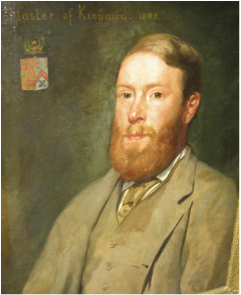MARCH 8th 1873
FIFA recognised the Scotland v England match played in November 1872, as the world's first international football match - it was played in Glasgow and ended in a 0-0 draw. The second-ever international saw England entertain Scotland in the return fixture played on Saturday 8th March 1873. It saw a number of significant firsts - it was the first international match played in England and saw the first international goals scored by England and Scotland. In addition as England scored more goals than Scotland they won their first match and so genuinely could be called the world's top footballing power! The match itself was played in front of around 3,000 at the Surrey Cricket Ground which later became better known as The Oval. England won the match 4-2 with the first goal being scored in the first couple of minutes by England's William Kenyon-Slaney who played for the Wanderers. Scotland's first goal came from Henry Renny-Tailyour who was only in the team because Scotland could only afford the train fare from Glasgow to London for 8 players with the other three being based in London - Renny-Tailyour played for the Royal Engineers. Henry Renny-Tailyour was born in India (as was William Renny-Tailyour) and was a bit of a sporting all-rounder who also played for Scotland at rugby union and for Kent at cricket. This link is definitely worth a look:http://www.englandfootballonline.com/seas1872-00/1872-73/M0002Sco1873.html
Scotland 1873. Back: William Gibb, Robert Smith, Henry Renny-Tailyour, James Thomson, William Ker, William Mackinnon. Front: David Wotherspoon, John Blackburn, Robert Gardner (captain), Arthur Kinnaird and Joseph Taylor.

Scotland 1873. Back: William Gibb, Robert Smith, Henry Renny-Tailyour, James Thomson, William Ker, William Mackinnon. Front: David Wotherspoon, John Blackburn, Robert Gardner (captain), Arthur Kinnaird and Joseph Taylor.
“He did more to popularise soccer than any man who ever lived” *

Arthur Kinnaird (later Lord Kinnaird, 1847-1923) was football's first superstar. Educated at Cheam School, Eton and Cambridge University.
Described as 'without exception, the best player of the day', he took part in nine FA Cup Finals (a record to this day), selected Scotland's first international team, and was President of the Football Association for 33 years.
He was such a dominant figure in the game that he was presented with the FA Cup in gratitude.
In his time and under his leadership, football rose from obscurity, played on muddy parks in front of a handful of spectators, to become Britain's national sport, with crowds of up to 100,000.
AF Kinnaird played an integral role as football swept the country like wildfire, thanks to the creation of easily-understood rules and crowd-pulling competitions.
Yet he was no mere footballer made good: a consummate philanthropist, he spent his youthful nights helping destitute orphans to read and write, devoted every waking hour to good causes, and earned a fortune in his career as a banker only to give much of it away.
As Lord Kinnaird, an ancient title he inherited in 1887, he led national bodies such as the YWCA and the YMCA, was Lord High Commissioner to the General Assembly of the Church of Scotland, and fostered the spread of evangelical religion.
His sporting accomplishments were widespread: at Cambridge University he won a tennis blue, he played university fives and was a swimming champion. He took first place in an international canoe race, won athletics prizes as a youth and played competitive cricket past his fiftieth birthday.
This was, however, no life of unburdened triumph: he lost two sons in the First World War, tragedies which eventually led to the demise of the Kinnaird title before the 20th century was out.
Described as 'without exception, the best player of the day', he took part in nine FA Cup Finals (a record to this day), selected Scotland's first international team, and was President of the Football Association for 33 years.
He was such a dominant figure in the game that he was presented with the FA Cup in gratitude.
In his time and under his leadership, football rose from obscurity, played on muddy parks in front of a handful of spectators, to become Britain's national sport, with crowds of up to 100,000.
AF Kinnaird played an integral role as football swept the country like wildfire, thanks to the creation of easily-understood rules and crowd-pulling competitions.
Yet he was no mere footballer made good: a consummate philanthropist, he spent his youthful nights helping destitute orphans to read and write, devoted every waking hour to good causes, and earned a fortune in his career as a banker only to give much of it away.
As Lord Kinnaird, an ancient title he inherited in 1887, he led national bodies such as the YWCA and the YMCA, was Lord High Commissioner to the General Assembly of the Church of Scotland, and fostered the spread of evangelical religion.
His sporting accomplishments were widespread: at Cambridge University he won a tennis blue, he played university fives and was a swimming champion. He took first place in an international canoe race, won athletics prizes as a youth and played competitive cricket past his fiftieth birthday.
This was, however, no life of unburdened triumph: he lost two sons in the First World War, tragedies which eventually led to the demise of the Kinnaird title before the 20th century was out.

No comments:
Post a Comment